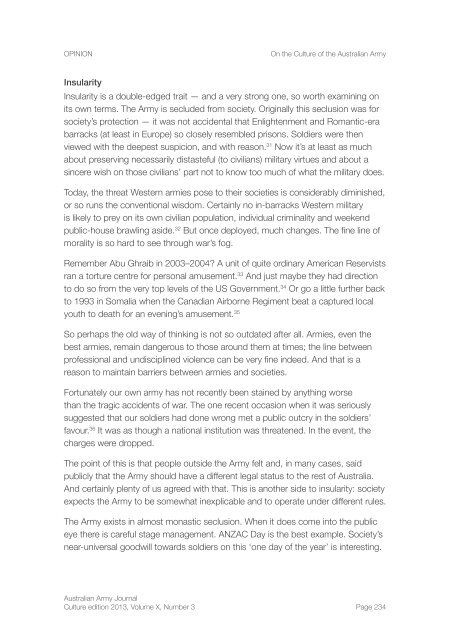Australian Army Journal
Australian Army Journal
Australian Army Journal
Create successful ePaper yourself
Turn your PDF publications into a flip-book with our unique Google optimized e-Paper software.
OPINION<br />
On the Culture of the <strong>Australian</strong> <strong>Army</strong><br />
Insularity<br />
Insularity is a double-edged trait — and a very strong one, so worth examining on<br />
its own terms. The <strong>Army</strong> is secluded from society. Originally this seclusion was for<br />
society’s protection — it was not accidental that Enlightenment and Romantic-era<br />
barracks (at least in Europe) so closely resembled prisons. Soldiers were then<br />
viewed with the deepest suspicion, and with reason. 31 Now it’s at least as much<br />
about preserving necessarily distasteful (to civilians) military virtues and about a<br />
sincere wish on those civilians’ part not to know too much of what the military does.<br />
Today, the threat Western armies pose to their societies is considerably diminished,<br />
or so runs the conventional wisdom. Certainly no in-barracks Western military<br />
is likely to prey on its own civilian population, individual criminality and weekend<br />
public-house brawling aside. 32 But once deployed, much changes. The fine line of<br />
morality is so hard to see through war’s fog.<br />
Remember Abu Ghraib in 2003–2004? A unit of quite ordinary American Reservists<br />
ran a torture centre for personal amusement. 33 And just maybe they had direction<br />
to do so from the very top levels of the US Government. 34 Or go a little further back<br />
to 1993 in Somalia when the Canadian Airborne Regiment beat a captured local<br />
youth to death for an evening’s amusement. 35<br />
So perhaps the old way of thinking is not so outdated after all. Armies, even the<br />
best armies, remain dangerous to those around them at times; the line between<br />
professional and undisciplined violence can be very fine indeed. And that is a<br />
reason to maintain barriers between armies and societies.<br />
Fortunately our own army has not recently been stained by anything worse<br />
than the tragic accidents of war. The one recent occasion when it was seriously<br />
suggested that our soldiers had done wrong met a public outcry in the soldiers’<br />
favour. 36 It was as though a national institution was threatened. In the event, the<br />
charges were dropped.<br />
The point of this is that people outside the <strong>Army</strong> felt and, in many cases, said<br />
publicly that the <strong>Army</strong> should have a different legal status to the rest of Australia.<br />
And certainly plenty of us agreed with that. This is another side to insularity: society<br />
expects the <strong>Army</strong> to be somewhat inexplicable and to operate under different rules.<br />
The <strong>Army</strong> exists in almost monastic seclusion. When it does come into the public<br />
eye there is careful stage management. ANZAC Day is the best example. Society’s<br />
near-universal goodwill towards soldiers on this ‘one day of the year’ is interesting.<br />
<strong>Australian</strong> <strong>Army</strong> <strong>Journal</strong><br />
Culture edition 2013, Volume X, Number 3 Page 234

















